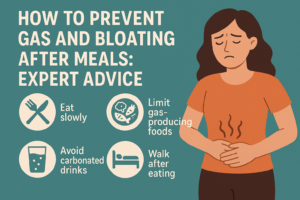
Feeling bloated or gassy after meals is more common than you might think. Many people struggle with abdominal discomfort, heaviness, and embarrassing gas—especially after eating. While occasional bloating is usually harmless, frequent gas and bloating can indicate poor digestion or dietary habits that need adjustment.
In this article, we’ll explore the most common causes of gas and bloating, give you practical prevention tips, and offer expert advice that can help you feel lighter, healthier, and more confident after every meal.
✅ Why Does Gas and Bloating Happen?
Gas and bloating occur when your digestive system has trouble breaking down the food you eat. This can be due to the food itself, how fast you eat, or underlying digestive issues. Let’s look at the most common causes:
- Eating too fast
- Swallowing air while chewing or drinking
- Consuming gas-producing foods like beans, lentils, cabbage, or carbonated drinks
- Food intolerances (lactose, gluten, etc.)
- Poor gut health or imbalance of gut bacteria
- Chronic constipation
- Lack of physical activity after meals
Understanding the cause of your bloating is the first step toward managing it effectively.
🍽️ Expert Tips to Prevent Gas and Bloating After Eating
1. Eat Slowly and Mindfully
Fast eating causes you to swallow air along with food. This can lead to gas accumulation in your stomach. Slow down, chew thoroughly, and savor your food. It also helps your body recognize fullness and improves digestion.
2. Avoid Overeating
Large meals can stretch your stomach and make digestion harder. Instead of eating heavy meals, try smaller, more frequent portions throughout the day. This gives your digestive system time to work efficiently.
3. Limit Gas-Producing Foods
Some foods are notorious for causing gas and bloating:
- Beans and lentils
- Cruciferous vegetables like cabbage, broccoli, and cauliflower
- Onions and garlic
- Fizzy drinks and sodas
- Artificial sweeteners
You don’t have to eliminate these completely—but watch your portion sizes and track which ones affect you the most.
4. Stay Hydrated, But Not During Meals
Drink water throughout the day, but avoid gulping down liquids right before or during meals. Too much water while eating can dilute stomach acids, making digestion less efficient.
5. Move After Eating
A short walk after your meal can stimulate digestion and reduce bloating. Avoid lying down immediately, as this slows down gastric emptying and can increase gas formation.
6. Improve Your Gut Health
A healthy gut plays a major role in preventing gas and bloating. Consider adding:
- Probiotics (yogurt, kefir, fermented foods)
- Prebiotic foods (bananas, garlic, oats)
- High-fiber fruits and vegetables (but add fiber slowly to avoid initial gas)
Maintaining a balance of good bacteria helps break down food more effectively and keeps your stomach happy.
7. Limit Dairy If You’re Lactose Intolerant
Lactose intolerance is a common cause of post-meal bloating. If you notice discomfort after eating cheese, milk, or ice cream, consider switching to lactose-free products or plant-based alternatives.
8. Skip Chewing Gum
Chewing gum may seem harmless, but it can cause you to swallow air. It also often contains sugar alcohols that ferment in your gut—leading to even more gas.
🌿 Natural Remedies That Can Help
Sometimes you need quick relief. Try these home remedies known to ease gas and bloating:
- Fennel seeds (saunf): Chew a teaspoon after meals to relieve bloating.
- Ginger tea: Stimulates digestion and calms the stomach.
- Peppermint tea: Known for its soothing effects on the digestive tract.
- Ajwain (carom seeds): A traditional Indian remedy for gas.
🚨 When Should You See a Doctor?
Occasional bloating is normal. But frequent or painful bloating could be a sign of a deeper issue like:
- Irritable Bowel Syndrome (IBS)
- Food intolerances
- Constipation
- Gastritis or acid reflux
- Gallbladder issues
If your symptoms persist, it’s time to seek expert care. You may need diagnostic tests like an ultrasound, endoscopy, or food sensitivity test.
A consultation with one of the top 10 gastroenterologist in Surat can help you uncover the root cause and receive a personalized treatment plan.
🥗 What to Eat to Reduce Bloating?
Here’s a digestive-friendly diet you can follow:
Foods that help digestion:
- Papaya and pineapple (contain digestive enzymes)
- Bananas (high in potassium)
- Rice and oats (easy to digest)
- Zucchini, spinach, and carrots (low-fiber veggies)
- Herbal teas (ginger, chamomile)
Foods to avoid:
- Fried and spicy food
- Dairy (if lactose intolerant)
- Excess sugar and salt
- Heavy legumes or pulses
- Carbonated beverages
Bonus Tip: Try a food diary. Tracking what you eat and how you feel afterward can help you identify triggers.
✨ Final Thoughts
Gas and bloating can take a toll on your comfort and confidence. But with simple lifestyle changes, a mindful diet, and expert support—you can enjoy your meals without the aftershock.
If your bloating is persistent or affecting your daily life, don’t ignore it. Proper diagnosis and treatment can make a world of difference. Start with the basics, listen to your body, and reach out for help when needed.
Remember: A happy gut = a happy you
